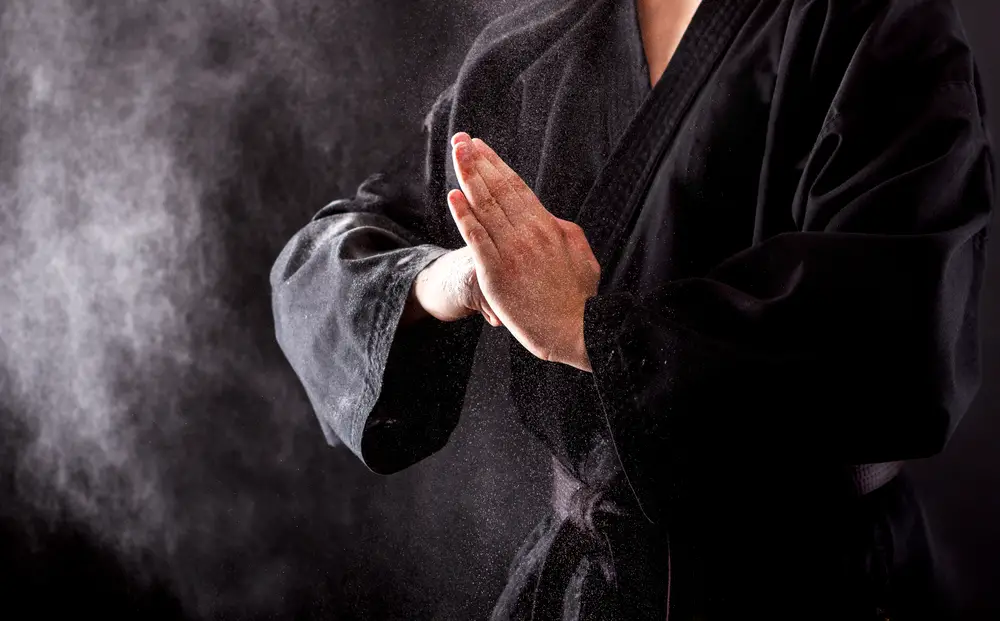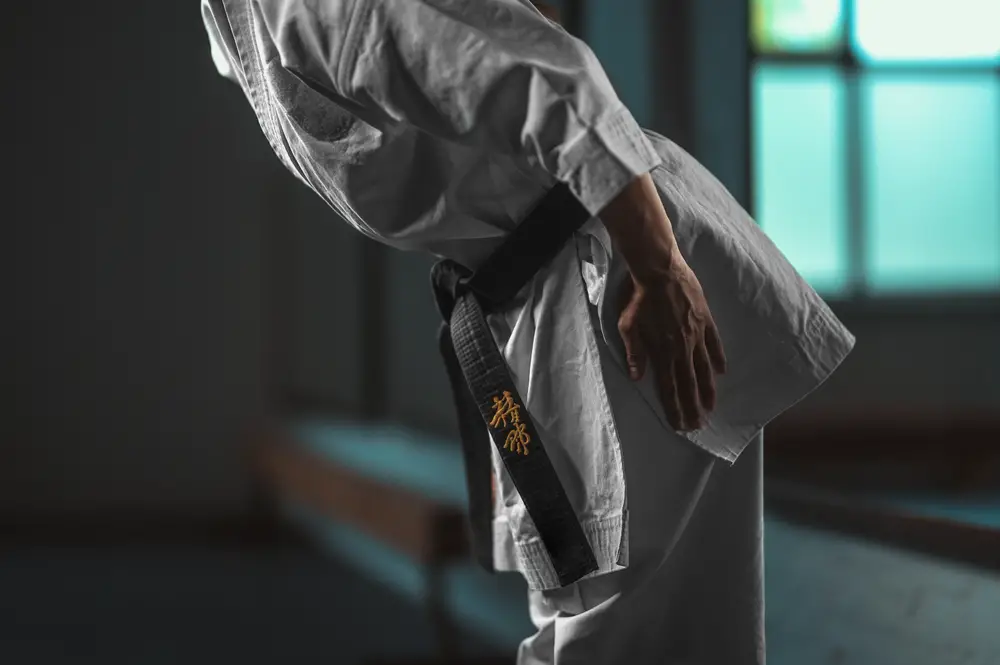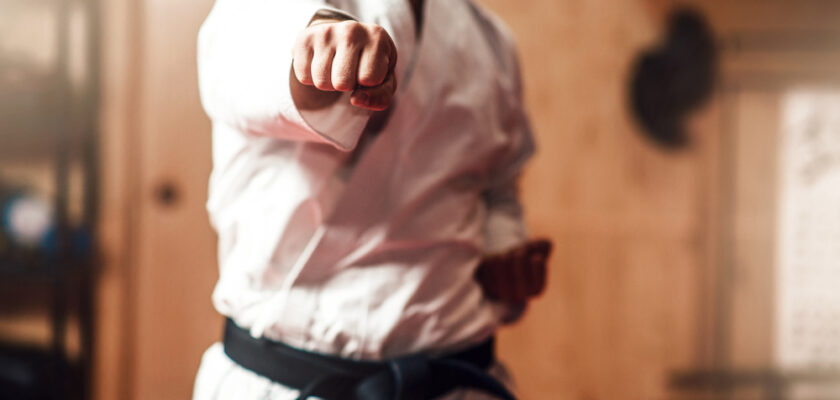Karate is a martial art born in Japan and very popular all over the world. The sport is much more than just a set of movements and combat techniques, but also a long path of self-development and discipline, cultivated and honed over centuries.
To make you even more aware of the sport, we’ve created the karate glossary, which includes the main terms used among athletes. Through them, you’ll learn more about how the sport works, understanding its objectives and its rules.
But before getting to know the glossary of karate, it’s worth remembering that the practice of the sport goes beyond the physical, as it also incorporates mental and spiritual elements that help the athlete develop patience, concentration and respect.
Within the tradition of karate, which is so important, there are specific terms that are fundamental to understanding not only the technical aspects, but also the values and philosophy of this practice. So let’s get to know the karate glossary, shall we?

Open your Betano account and get up to 1,000 reais in bonuses.
Payments via PIX, live games and super odds!
Clique aqui para abrir sua conta!
Karate glossary: complete list
- Ashi Barai
- Dojo
- Empi
- Gedan Barai
- Gi
- Hikite
- Jodan Uke
- Karate
- Kata
- Kiba Dachi
- Kihon
- Kumite
- Maai
- Mae Geri
- Mawashi Geri
- Obi
- Osu
- Rei
- Seiken
- Sensei
- Sensei Ni Rei
- Shomen
- Ushiro Geri
- Yame
- Yoko Geri
- Zanshin
- Zenkutsu Dachi
Karate glossary: get to know the terms
Ashi Barai
Name given to a leg sweep, being a technique used to unbalance and knock down the opponent. It is usually combined with other attack techniques.
Dojo
Dojo is the name of the place where karate is practiced. Translated as “training room”, the dojo is a sacred space where practitioners learn and cultivate their skills under the supervision of a sensei.
Empi
An elbow strike. It’s a powerful technique, often used in close-range combat.
Gedan Barai
A downward block used by the judoka to defend against low attacks, such as kicks or punches to the abdomen.
Gi
Gi is the uniform worn by karate practitioners, consisting of white pants and jacket. The gi symbolizes purity, humility and uniformity of practice.
Hikite
Hikite is a technique of retracting the unused hand during a punch. Hikite is essential for generating power and balance in punching techniques.
Jodan Uke
Upper block, i.e. a technique used to defend the head from high attacks such as punches and kicks.
Karate
The meaning of the word karate is “the way of the empty hand”. The sport is a Japanese martial art that focuses on using the body for defense and attack. Karate not only involves combat techniques, but also promotes mental and spiritual development.
Kata
Kata is the name given to a sequence of predetermined movements that simulates combat against imaginary opponents. The katas are fundamental to the practice of karate, helping to develop techniques, strength and precision.
Kiba Dachi
Kiba Dachi is the knight’s stance, performed with the feet parallel and apart. It is a fundamental posture that offers stability and balance, and is used in various techniques and katas.
Kihon
Basic karate fundamentals, including stances, striking techniques and defense. Kihon training is essential for building a solid foundation in any style of martial art.
Kumite
This is free combat between two karate practitioners. Kumite can range from simulated to totally free combat and is an essential part of training to test skills in a controlled environment.
Maai
Distance between practitioners during combat. Understanding and controlling maai is crucial for effective attacks and defenses.
Mae Geri
A front kick, mae geri is one of the most basic and important kicking techniques in karate, used in both defense and attack.
Mawashi Geri
Circular kick, an advanced technique that involves rotating the body to launch a powerful and precise kick.
Obi
This is the name given to the belt used to tie the gi, indicating the level of graduation of the practitioner. The colors of the sashes vary according to the student’s progress, from white to black.
Osu
A Japanese term used to demonstrate respect, determination and commitment. Osu is a common expression in the dojo, reflecting the attitude and mentality of a true karate practitioner.
Rei
Salute, indicating respect and courtesy. The practice of rei is an integral part of karate, reflecting the values of respect and humility.
Seiken
This is the knuckle movement used for fist strikes. Correct seiken technique is essential to maximize impact and avoid injury.
Sensei
A Japanese term that means “teacher” or “master” and refers to the main karate instructor, who guides and teaches students in both the techniques and philosophy of the martial art.
Sensei Ni Rei
Salute to the master, made at the beginning and end of class. It is a show of respect and gratitude for the knowledge shared by the sensei.
Shomen
Forward direction. Term used to indicate the main direction in which the practitioner should focus, especially during greetings and katas.
Ushiro Geri
A back kick executed by turning the body and throwing the foot backwards, it is a surprising and very powerful technique.
Yame
Command to stop or interrupt an activity, usually used by the sensei to signal the end of a practice or combat session.
Yoko Geri
Side kick. This technique is used to hit the opponent from the side and is powerful and effective when executed correctly.
Zanshin
A state of constant attention and vigilance. Even after completing a technique or combat, the fighter maintains situational awareness and readiness to react.
Zenkutsu Dachi
Front stance, with one leg in front and the other behind. This stance is used to practice karate techniques, providing stability and strength.

Karate glossary: complete list
- Ashi Barai
- Dojo
- Empi
- Gedan Barai
- Gi
- Hikite
- Jodan Uke
- Karate
- Kata
- Kiba Dachi
- Kihon
- Kumite
- Maai
- Mae Geri
- Mawashi Geri
- Obi
- Osu
- Rei
- Seiken
- Sensei
- Sensei Ni Rei
- Shomen
- Ushiro Geri
- Yame
- Yoko Geri
- Zanshin
- Zenkutsu Dachi
Karate glossary
If you enjoyed learning about the karate glossary and getting to know the sport, take the opportunity to continue browsing the site to find out more about this and many other sports.
Don’t forget that your comments are also very welcome here, so be sure to let us know what you think of our content!



